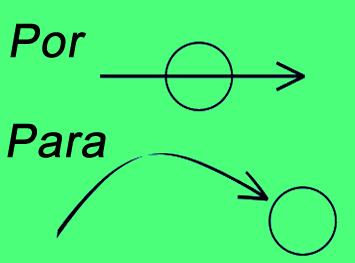Difference between revisions of "Language/Spanish/Grammar/Por-vs-Para"
| Line 33: | Line 33: | ||
=== Refers to the cause === | === Refers to the cause === | ||
*<span class="notranslate">Es famoso por su canción</span> | *<span class="notranslate">Es famoso por su canción</span> | ||
He is famous because of - or thanks to - this song | <blockquote>He is famous because of - or thanks to - this song</blockquote> | ||
=== Refers to a space crossing === | === Refers to a space crossing === | ||
Revision as of 21:10, 29 September 2018
Today, we are approaching a point that may seem difficult for those learning Spanish.
Let's discover, together, how to avoid confusing these two words and avoid many errors!
- "POR": refers to the cause or means
- "PARA": is used to say the purpose
A rather schematic picture to summarize this:
BUT I have two bad news:
There are exceptions to this rule, otherwise it would be too easy!
The only way to master these exceptions: learn them by heart and little by little.
As usual, do not think to read this article and have definitively solved the problem between "POR" and "PARA".
I'm going to teach you to distinguish them, but to make no more mistakes, make a record "POR" / "PARA" and come back regularly.
Write down any difficulties you encounter to personalize your card and memorize it.
Spanish is being learned little by little.
SO COURAGE! We've all been there! Master these exceptions little by little, and without pressure. You have to spend time and come back with a smile!
Some ways to start your listing:
Specificities of "POR"
Refers to the cause
- Es famoso por su canción
He is famous because of - or thanks to - this song
Refers to a space crossing
- pasar por
Indicates a time of the day
- por la mañana, por la tarde, por la noche.
- Por la mañana, suelo desayunar mucho. (In the morning, I usually eat a lot of breakfast)
Express a feeling
- Me apasiono por el español.
- Tengo asco por el inglés o el alemán.
Price or exchange
- Lo he comprado por diez euros. (I bought it for ten euros)
Verbs that are always followed by "por"
This is the case, for example, with "preocuparse por" or "interesarse por"
- Me preocupo por tu salud (I am worried about your health)
- Me intereso por tu historia. (I'm interested in your story)
Thank for
"Thanks for" will always result in "gracias por"
- Gracias por leer este artículo. (Please read this article) 😉
Specificities of "PARA"
Express the purpose
- El regalo es para los lectores del blog. (The gift is for blog readers.)
Express the goal
- Para practicar español, no es necesario vivir en un país hispanohablante. (To learn Spanish, you do not have to live in a Spanish speaking country.)
Refers the recipient
- Este regalo es para ti. (This gift is for you)
Express a point of view
- Para mí, es importante viajar. (For me it is important to travel).
Announces a scheduled date
- Para el 20 de mayo, hay que aprender esta lección.(For May 20, you have to learn this lesson.)
“estar para”
This expression is used to indicate an action that is about to be realized:
- Estamos para terminar la lección de hoy. (We are about to finish today's lesson.)
Videos
POR
PARA
Sources
https://espagnol-pas-a-pas.fr/por-et-para-comment-enfin-ne-plus-les-confondre/

